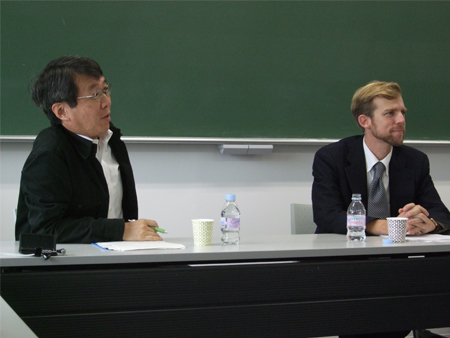Report: Seminar “Secularization, Religion, State” Session 9
On October 20th, the ninth session of the seminar “Secularization, Religion, State” was held.
Dr. Lombardi, associate professor of law at the University of Washington, delivered a lecture, titled “Judicial Interpretation of Shari‘a : In Egypt, Trends and Implications,’’ in this session.

In his talk, Dr. Lombardi first posed the question ‘‘What is Islamic law? ’’ He pointed out that it is one of the accepted truisms of Islamic jurisprudence that Islamic law is a ‘‘jurists’’ law. Moreover, he mentioned that, in the famous An introduction to Islamic law, written by Joseph Schacht in 1964, we are told that in an Islamic legal system judges do not interpret Islamic law. However, he focused in particular on the rise of ‘‘Islamic Review’’ in modern Egypt, and insisted that courts have often interpreted Islamic law in a liberal and human-rights friendly way in Egypt.
After that, he talked about classical Islamic law briefly and resulted there was a kind of collapse of consensus about how Muslims should interpret Islamic law. Rather, he singled out two persons who tried the modern method of interpreting Islamic law in Egypt. One was Rashid Rida, and the other ‘Abd-al Razzaq al- Sanhuri. Rida allowed an interpreter to base his interpretation on rational utilitarian conclusions. His method, ‘‘utilitarian neo-ijtihad’’, was not limited to the small class of Islamic jurists. On the other hand, Sanhuri, who studied modern European law in France, refused classical ijtihad. According to Dr. Lombardi, Sanhuri urged that Islamic law should be derived through a new, decidedly modern form of precedential reasoning.
At the end of his lecture, Dr. Lombardi mentioned the change in Islamic law in modern Egypt. Actually, he pointed out that shifts from ‘‘jurists’ law’’ to ‘‘judges law’’ were confirmed. He also emphasized that if we want to know about the state of Islamic law today, we should read not only a classic legal books but also newspapers to find out about current circumstances in that region.
After his lecture, we had productive discussions, for example on the meaning of ‘‘liberal’’ that Dr. Lombardi used in his lecture. Prof. Haneda commented that his new book titled State law as Islamic law in modern Egypt published in 2006, will soon take Schacht’s book’s place.
Reported by Kazuaki SAWAI






